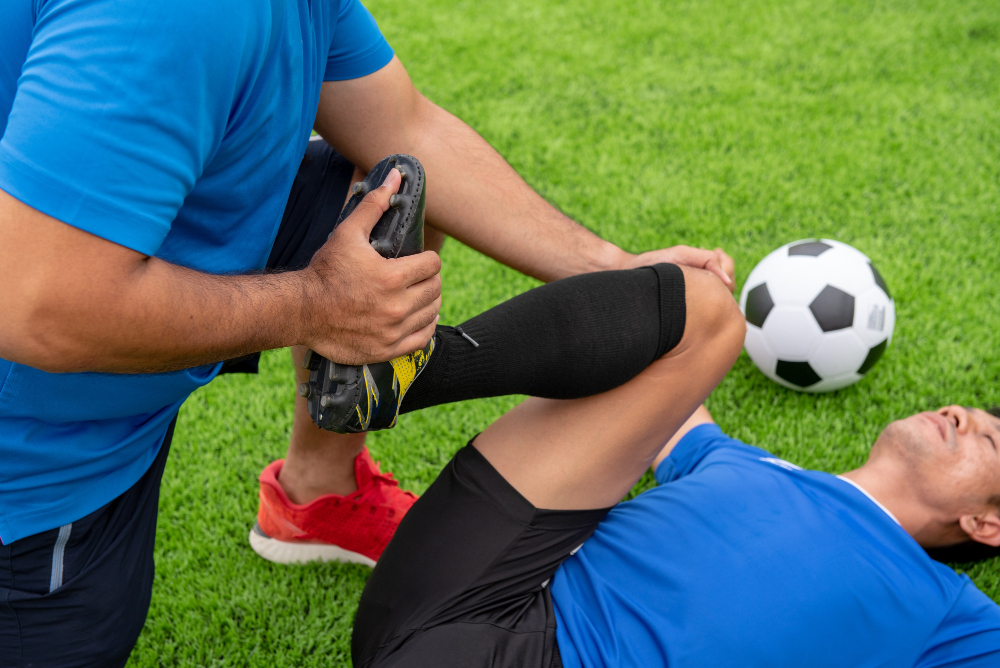Types of Sports Injury Physiotherapy
1. Strengthening Exercises:
Strengthening exercises target specific muscle groups to improve strength and stability, reducing the risk of injury and enhancing athletic performance. These exercises involve progressively overloading the muscles to stimulate growth and adaptation, guided by a physiotherapist to ensure proper technique and safety.
How to Implement:
- Consult with a sports physiotherapist to assess your current strength and identify areas for improvement.
- Follow a personalized strengthening program tailored to your specific needs and goals.
- Gradually increase the intensity and resistance of exercises over time to continue challenging your muscles and promoting growth.
2. Soft Tissue Mobilization:
Soft tissue mobilization techniques are used to address muscle tightness, adhesions, and scar tissue, promoting flexibility, circulation, and healing. These techniques may include massage, myofascial release, and instrument-assisted mobilization, administered by a skilled physiotherapist to target specific areas of dysfunction.
How to Implement:
- Schedule regular sessions with a sports physiotherapist trained in soft tissue mobilization.
- Communicate any areas of pain or stiffness to your physiotherapist for targeted treatment.
- Incorporate self-care techniques such as foam rolling and stretching into your daily routine to maintain soft tissue health.
3. Pain Management:
Pain management strategies aim to alleviate discomfort and improve function, allowing athletes to continue training and competing effectively. These may include manual therapy, modalities such as heat and cold therapy, and education on pain coping strategies and activity modification.
How to Implement:
- Work closely with your sports physiotherapist to identify the underlying cause of your pain.
- Follow prescribed exercises and modalities to manage pain and promote healing.
- Learn techniques for pain coping and stress management to improve overall well-being.
When to Seek Sports Injury Physiotherapy
Sports Injury Physiotherapy should be sought immediately following an injury or when experiencing persistent pain or dysfunction. Prompt intervention can help prevent further damage, expedite recovery, and optimize outcomes. Whether you’re a professional athlete or a weekend warrior, consulting with a sports physiotherapist at the first sign of trouble can make a significant difference in your recovery journey.
Risks of Sports Injuries
Sports injuries pose various risks, influenced by factors such as age, skill level, equipment use, and environmental conditions. Without proper prevention and management, these injuries can lead to long-term consequences and impact athletic performance and quality of life. Understanding the potential risks and taking proactive measures to mitigate them is essential for maintaining health and well-being.
Preventing Sports Injuries
Prevention is key when it comes to sports injuries, and implementing simple yet effective strategies can significantly reduce the risk of experiencing setbacks. Here are some practical tips for preventing sports injuries:
1. Taking Time Off:
Allowing your body adequate rest and recovery time is essential for preventing overuse injuries and promoting overall well-being. Plan regular rest days and incorporate active recovery activities into your routine to optimize recovery and minimize the risk of burnout.
2. Wearing Proper Gear:
Invest in high-quality protective equipment appropriate for your sport or activity. Helmets, pads, mouthguards, and supportive footwear can help prevent injuries by absorbing impact forces and providing support and stability to vulnerable areas.
3. Conditioning Exercises:
Include strength training, flexibility, and balance exercises in your training regimen to build resilience and reduce the risk of injury. Focus on developing functional strength and addressing muscle imbalances to improve overall performance and durability.
4. Stretching Routine:
Incorporate dynamic warm-up and static stretching exercises into your pre and post-workout routine to improve flexibility and mobility. Stretching helps prepare your muscles and joints for activity, reducing the risk of strains, sprains, and other injuries.
5. Learning Proper Techniques:
Take the time to learn and practice proper technique for your sport or activity under the guidance of a qualified coach or instructor. Using correct form and movement patterns can help prevent overuse injuries and maximize performance while minimizing the risk of injury.
The role of physiotherapy in rehabilitating sports injuries
- It can range from minor strains and sprains to more serious injuries such as fractures and ligament tears. Regardless of the severity of the injury, physiotherapy can play a key role in the rehabilitation process.
- Physiotherapists can design a treatment plan that includes exercises to improve strength, flexibility, and range of motion and modalities such as heat or cold therapy to reduce pain and swelling.
- In addition to traditional physiotherapy, physiotherapists may also use specialized techniques such as massage, taping, or dry needling to help athletes recover from injuries and return to their sport as quickly and safely as possible.
Related Conditions
Sports Injury rehabilitation in Bangalore or Hyderabad aims to restore lost mobility through exercises and therapy sessions. SwastyaPhysio’s expert physiotherapists treat conditions such as total hip replacement, total knee replacement, and spine surgeries, helping patients build muscle strength and improve posture and balance. This comprehensive approach reduces pain through multiple manual therapies, crucial for strengthening disused and weakened muscles.












